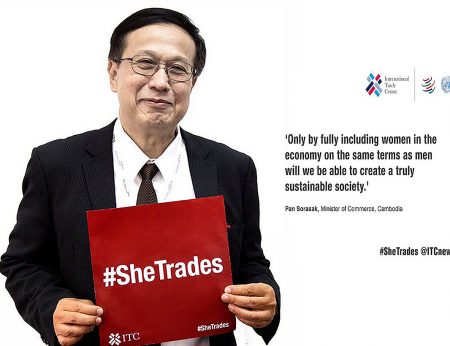After eight years of discussions and negotiations Cambodia looks as if it might finally be getting close to introducing an E-Commerce law, with a draft resolution ready to submit to the Council of Ministers for approval.
Funded in part by US$12.35 million in financing to the World Bank’s Trade Development Support Program (TDSP) from the Multi Donor Trust Fund (MDTF) by the European Commission, the government of Denmark (Danida), and the United Nations Industrial Development Organization (Unido), drafting the Cambodia E-Commerce law has required the involvement of three ministries and the National Bank of Cambodia (NBC).
With the Ministry of Post & Telecommunication (MPTC) putting the number of internet users at some 7.2 million as of July this year, plus some 20 million mobile phone subscribers, Cambodia is experiencing rapid internet penetration.
However, for those attempting to do business online as either a vendor or consumer the regulatory arena has, and remains, a lawless frontier, stifling growth in a sector that is growing exponentially throughout the region and globally. It is hoped that the E-Commerce law will bring some order to a sector that currently operates how it sees fit.

While an E-Commerce law will not on its own see an explosive growth in e-Commerce businesses in the kingdom of just 15.9 million people – matters such as immature payment methods, poor product delivery channels, and patchy internet services being just a few of the others – it is hoped that it will add a degree of certainty and build consumer and vendor confidence. The commencement of operation early next year of the Malaysia-Cambodia-Thailand (MCT) submarine cable (See: New Cables to Boost Internet Service In Five Asean Nations) is expected to improve internet quality and penetration, further stimulating the sector.
Driving Cambodia’s E-Commerce law catch-up (Cambodia is the only Asean member country without an e-Commerce law) is Pan Sorasak, Cambodia Minister of Commerce.
Expecting the E-Commerce law should be presented for parliamentary review next year, Mr Pan told those attending the recent Pannasastra University of Cambodia ITC 2016 conference and exhibition that the “E-Commerce law will create a new business environment… facilitating the integration of Cambodia’s goods into the regional and global production network”.

Reportedly comprising 12 chapters containing 90 articles, Kem Saroeung, director of the legal affairs department at the Ministry of Commerce (MoC), said the E-Commerce law required special reviewing by experts as it contains numerous technical terms and needs to align with the business environment in the country.
According to a media release posted on the MoCs Facebook page, along with a 9-minute video explaining the the E-commerce law drafting process, the benefits e-commerce can bring, for young entrepreneurs in Cambodia in particular, ‘requires specific rules and regulations to manage its transactions to ensure accuracy and safety for all the concerned parties’.
In addition to covering regulatory fundamentals, the draft Cambodia E-Commerce law also overs E-payments, and stipulates punishment for those who abuse the law. According to Mr Kem it will provide protection to both vendors and consumers.
Related:
- Cambodia Is Speeding The Adoption Of E-Commerce Law (Ministry of Commerce)
- Cambodia’s New E-Commerce Law (Globe Business Media Group)
- Cambodia drafts E-commerce law as online sales grow (Xinhua)
Leakhena Khat
“I love what I am doing so much as it gives me a lot of great experience and provides challenges to my mind.
Latest posts by Leakhena Khat (see all)
- Lao Morning News For June 29 – June 29, 2018
- Myanmar Morning News For June 29 – June 29, 2018
- Singapore Morning News For June 29 – June 29, 2018
- Lao Morning News For June 28 – June 28, 2018


